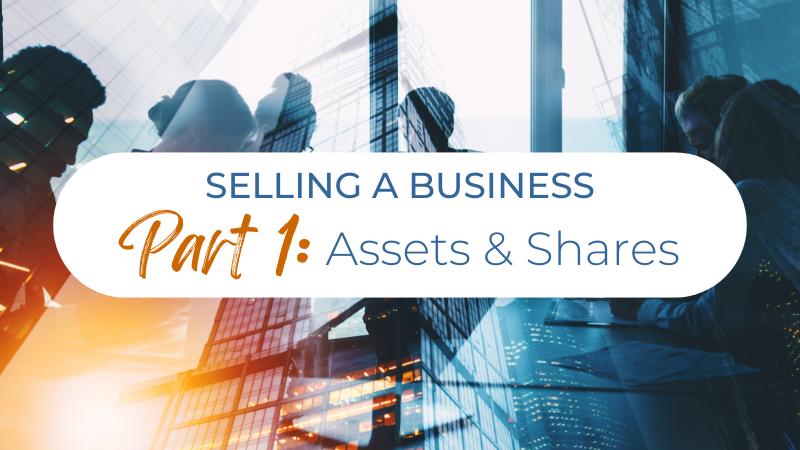Buying or selling a business is an exciting process but it can be overwhelming to know where to start. Good planning and preparation can help to ensure that the transaction runs smoothly and efficiently, with minimum disruption to the business. It is also important to ensure that you are aware of your obligations and the rights of your employees, otherwise, you could expose yourself to claims further down the line.
This article is the first of a two-part series – please find part two here.
First things first
While the benefits of a business sale can be clear, it’s important that it’s handled correctly so that it doesn’t lead to any costly issues for you later down the line. Key decisions, such as making sure the terms of sale are laid out clearly and fairly, are necessary to avoid any disputes after the transaction has taken place.
There are two common ways that you can buy or sell a business – an asset sale or a share sale. Each has its own benefits, and the way in which the transaction is structured will depend on your goals.
Next, you need to consider how you’d like to sell the business
As mentioned, businesses can be sold as either an asset sale or a share sale. It is important to consider which of these most suit your goals and objectives.
Asset sale
An asset sale is a transaction that involves selling a business as a going concern by way of a sale and purchase of assets. The company can sell some or all of its assets so can include, good will, customer list, contracts and machinery etc. The transaction is between the buyer and the seller “company”, and it will be company itself who is the recipient of the proceeds of the sale. In this instance, the selling company can “cherry pick” the parts of the business they wish to sell. It is important to note that the seller will retain ownership all other aspects of the business that are not included in the sale, including the company itself.
It is worth noting that in asset sale, the Transfer of Undertakings (Protection of Employment) Regulations 2006 (TUPE), will apply to the selling company employees. If TUPE does apply the employees of the selling business will TUPE across to the purchasing business on their existing terms and conditions, meaning the employees will continue to benefit from the same rights and protections. TUPE is a complex area of law and may form part of your asset sale.
Share sale
A share sale is where the selling shareholder is selling their shares in a company. This can sometimes involve one or all shareholders of the company selling their shares. A share sale therefore means that the shareholders are selling a portion of or all of the company and all that it has inside, including all the assets, liabilities, contracts and obligations of the company etc.
The transaction is between the buyer and the target company and the selling shareholders.
In the instance of a share sale, the employees remain contracted with the same company and therefore there is no TUPE to deal with. The buyer can then proceed to make redundancies or restructure staff as owner of the company, which can often be an attractive option to a potential purchaser.
Comparison of Asset and Share Sales
Choosing between an asset or share sale depends on what works for each of the buyer, seller and the business itself. Understanding the benefits and drawbacks of each option is key to ensuring a smooth transaction.
| Asset Sale | Share Sale | |
|---|---|---|
| What passes ownership? | The assets and liabilities (tangible and intangible) that the seller wants to sell, or the buyer wishes to buy. | The company shares. |
| Liabilities | Buyer can decide whether to purchase or avoid any liabilities | Buyers inherit all liabilities of the company. |
| Contracts | Contracts may need to be novated or reassigned to the Buyer. This will often require the consent of the other party. | Unless they contain a ‘change in ownership’ clause, contracts will not need to be transferred to the buyer as the company remains a party. Additionally, no third-party consent will be needed. |
| Continuity | Depending on what is being purchased, assets, liabilities, contracts and employees will have to pass over to the buyer and this may cause some disruption. | As the buyer inherits the target company’s legal entity, contracts, relationships, and business operations can continue without much (or any) interruption, and the transition for employees, customers and suppliers is seamless. |
| Employees | If TUPE applies, employees will need to be informed and consulted about the sale and are able to object to transferring, therefore leaving the company. | Employees remain contracted with the company and are usually not impacted by the sale of shares. |
How Backhouse can help
When you are selling your business, you should ensure that you seek professional legal and financial advice to protect your interests and achieve the best outcome.
If you are considering buying or selling a business, contact Backhouse Solicitors to speak to one of our corporate and commercial law experts.
Tel: 01245 893400
Email: info@backhouse-solicitors.co.uk
Visit: 17 Duke Street, Chelmsford, CM1 1JU
Or send us a message through the Contact Us page on this website.






